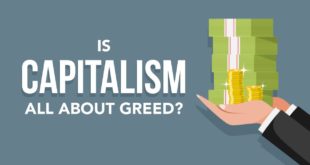.[embedded content] Though I speak with the tongues of angels, If I have not love… My words would resound with but a tinkling cymbal. And though I have the gift of prophesy… And understand all mysteries… and all knowledge… And though I have all faith So that I could remove mountains, If I have not love… I am nothing.
Read More »The darkest day (personal)
The darkest day (personal) Thirty years ago today, the unthinkable happened. Shortly after giving birth to our second child, my beloved wife Kristina died from an intracranial aneurysm. People say that time heals all wounds. I wish that was true. But some wounds never heal. Even after thirty years, you must learn to live with the scars. But in dreams,I can hear your name.And in dreams,We will meet again. When the seas and mountains fallAnd we come to end...
Read More »Girig-Sverige — eller när kommer kraschen?
Girig-Sverige — eller när kommer kraschen? Ekonomijournalistgruppen har en hel del tydliga devota och inställsamma inslag, där många, kanske de flesta, med tiden har valt att gå ”all in” och blivit PR-konsulter eller pressansvariga på något företag. Andreas Cervenka är ett lysande undantag och hans ”Girig-Sverige” är ekonomijournalistik när den är som bäst, kritisk, upplysande och underhållande … Sverige har numera enligt Cervenkas lista 541...
Read More »Minsky and Keynes show the way out of the crisis
Minsky and Keynes show the way out of the crisis American economist Hyman Minsky described capitalism as a “two price” system. On one side are asset prices—both financial, like government or corporate bonds, and physical like residential or commercial property. On the other, there are consumer prices—goods and services that determine current output and consumer price inflation. In the contemporary global economy, asset prices are much more sensitive to...
Read More »The truly scientific attitude
The truly scientific attitude I recall, with sadness, a comment made to me by the author of a well-known textbook. Upon being asked whether he accepted my analysis of demand theory as presented first in 1948, the reply was positive. He added that it would not be included in his advanced textbook because “it would upset too many things and be too disturbing, i.e., Dicta non movere.” So much for the acceptance of new scientific results and for a truly...
Read More »Adjusting for confounding (student stuff)
Adjusting for confounding (student stuff) .[embedded content] Simpson’s paradox is an interesting paradox in itself, but it also highlights a deficiency in the traditional econometric approach towards causality. Say you have 1000 observations on men and an equal amount of observations on women applying for admission to university studies, and that 70% of men are admitted, but only 30% of women. Running a logistic regression to find out the odds ratios (and...
Read More »Public debt and Keynes’ paradox of thrift
Public debt and Keynes’ paradox of thrift For although the amount of his own saving is unlikely to have any significant influence on his own income, the reactions of the amount of his consumption on the incomes of others makes it impossible for all individuals simultaneously to save any given sums. Every such attempt to save more by reducing consumption will so affect incomes that the attempt necessarily defeats itself. It is, of course, just as impossible...
Read More »New outlook …
These photos of my grand-father Oskar Lissmark and Kurt Gödel made me realize that my new specs perhaps weren’t that new after all …
Read More »Postmodern obscurantism
Among the soft obscurantists some aim at truth, but do not respect the norms for arriving at truth, such as focusing on causality, acting as devil’s advocate, and generating falsifiable hypotheses. Others do not aim at truth, and often scorn the very idea that there is such a thing. By assumption, these non-respecters of truth cannot be reached by argument, only by ridicule … Let me mention who they are, by discipline and by name. Disciplines include deconstructionism,...
Read More »Woke racism
.[embedded content]
Read More » Lars P. Syll
Lars P. Syll







